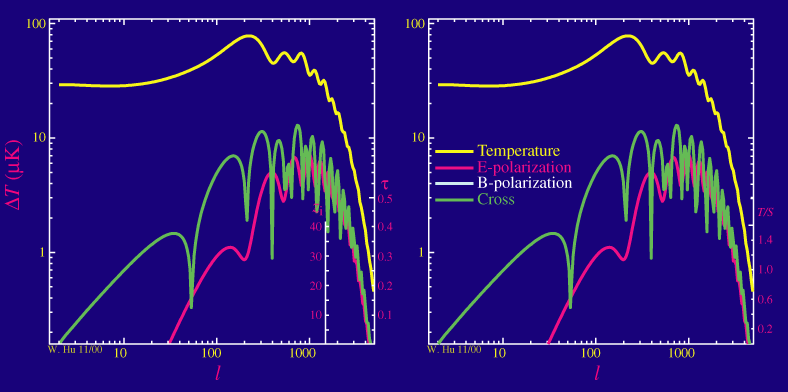
Now that we know how the precision of power spectrum measurements depends on the experimental parameters of sky coverage, instrument noise and resolution, we need to know how sensitive the power spectrum is to fundamental cosmological parameters.
As has been widely advertised in the cosmological literature, the CMB power spectrum is indeed quite sensitive to a host of cosmological parameters: from gravitational waves generated by inflation to the reionization of the universe by the first stars. The problem is that aside from the 4 parameters explicitly discussed above in the context of the acoustic peaks, these cosmological parameters tend to have similar effects on the power spectrum. Cosmologists call this a parameter degeneracy.
Gravitational waves and reionization actually provide a nice example. Both tend to suppress the power uniformly at high multipoles:

On the left, the reionization of the universe is parameterized by both the optical depth (or fraction of the CMB rescattered during reionziation) and the redshift of reionzation. On the right, the gravitational waves are parameterized by their contribution relative to density fluctuations at the quadrupole (l=2).
Clearly the two will be difficult to separate using information from the acoustic peaks alone. As a consequence of parameter degeneracy, there is often no definitive answer as to how well experiment X will measure parameter Y. It depends on what parameters you think are reasonable to vary. For example many reasonable cosmologists will tell you in the above example that gravitational waves are probably so small in amplitude that you can ignore them entirely; others will tell you that reionization should occur so late that it has essentially no effect on the CMB. Many seemingly conflicting statements in the CMB literature can be resolved if you look at what the implicit assumptions of the authors were.
As illustrated in this figure and covered in the next two sections, the polarization of the CMB and the secondary anisotropies that appear beyond the damping tail are promising ways to break these degeneracies. We've also seen the case of the dark energy that external information from the rest of cosmology can also be very useful in breaking degeneracies.